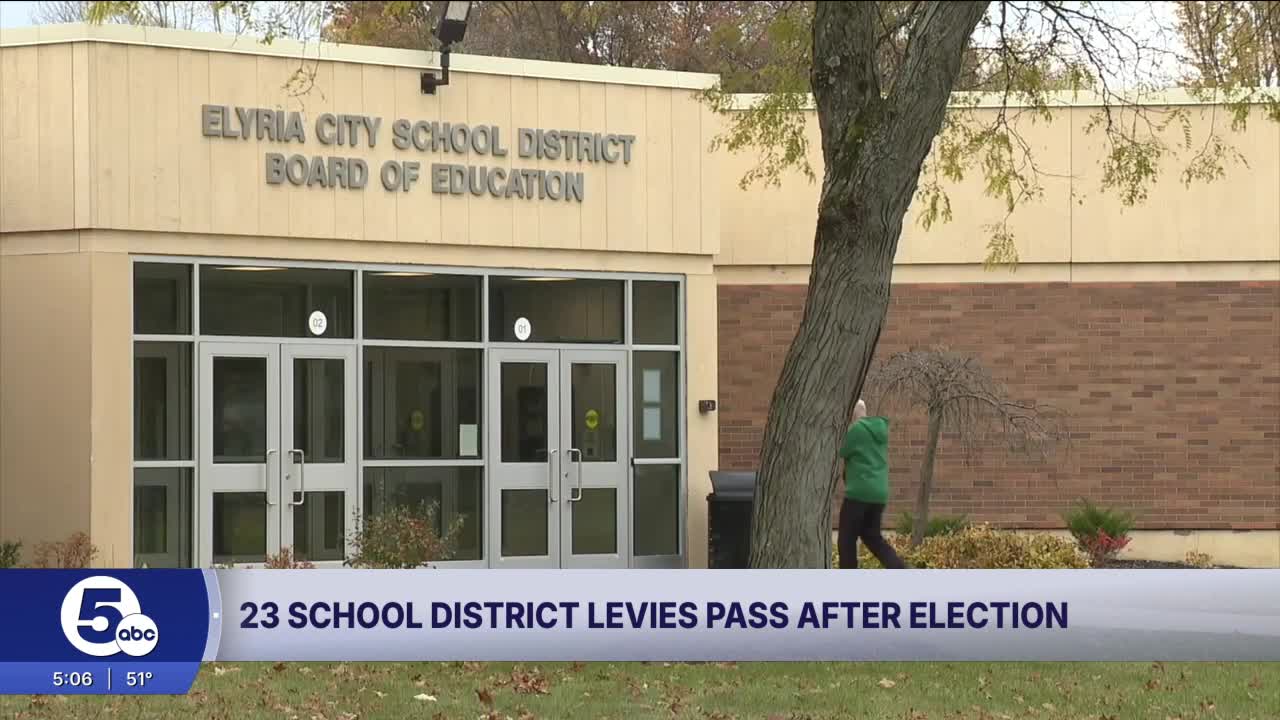COLUMBUS, Ohio — Of the school levies in Northeast Ohio that failed Tuesday, the majority would have raised homeowners' taxes.
Of the 38 school ballot issues, 23 passed and 15 failed. But there was a clear difference in the type of levy that was passed.
Renewal levies, which do not raise your taxes, passed 18 out of 20 times. While additional fund levies, which will increase your bills, failed 7 out of 10 times. This was the case for Elyria City Schools.
"It breaks my heart because I know what we do for our students and families. And any time you have to look at making cuts, no matter where the cuts are, it’s going to affect something,” Ann Schloss, the superintendent for Elyria City Schools, said.
RELATED: 'Tough decisions:' Northeast Ohio schools weigh options after rejected levies
But one of the three that succeeded was Shaker Heights City School District.
"I just wanna acknowledge and commend our community for their overwhelming support of the Shaker School District, particularly in today's day and age," David Glasner, Shaker superintendent, said.
A day and age where Glasner and all other public school leaders are facing cuts in state funding.
Nonpartisan research group Policy Matters Ohio found that the state slashed the expected public education spending by nearly $3 billion over the next two years.
"We're already under strain, so it would cause additional strain," Parma Schools Superintendent Dr. Scott Hunt said about what would happen if his levy failed.
RELATED: School levies are on the ballot. After this, big changes in Ohio.
Four bond issues also failed, as well as half of the four substitute levies.
On Wednesday, I asked House Speaker Matt Huffman (R-Lima) what he says to the schools that are asking for the state to step in and provide more financial support.
"It's kind of this, I guess, two-sided coin when folks say 'We want local control of our schools, but our local folks won't approve levies. We, therefore, want the state to give us the money, even though our local folks won't support that,'" Huffman responded.
The state is trying to deal with lowering property taxes, but Huffman added that schools need to be more fiscally responsible if their levies fail.
"An understanding that schools have to be more precise in their spending," Huffman said. "They're not going to be able to hire, especially on the administrative side, the people they've hired before."
Districts that failed argue that they have been responsible, while voters told us that the cost of living is too high to pay more.
"Why do you think Shaker was able to beat those odds?" I asked Glasner.
"I think Shaker was able to beat those odds because we have an incredible community that has historically and continues to support our public schools, and that really understands how valuable public schools are, not just to the students and families who are in them, but to the broader community as a whole and really, I would say, kind of an even bigger picture to our country and the health of our democracy," he responded.
The City of Shaker Heights has been a district at the forefront of both state and federal political discussions. The community not only shows up to vote, but had a turnout rate of nearly 70% during the 2024 presidential election, according to data from the Cuyahoga County Board of Elections. The city of about 30,000 voted for former VP Kamala Harris by nearly 90%.
The district being so engaged in how school funding works is a factor, Glasner added.
"The levy will play a critical role in advancing the district’s equity goals – racial, economic, ability-based, and beyond," the Stand Up for Shaker Schools levy campaign page wrote. "Funds will help every student access high-quality educational opportunities."
The superintendent also acknowledged that socioeconomic factors played into the passage. Census data shows the average Shaker Heights home is valued at around $300,000. Passing the levy will make tax bills go up more than $1,000 per year.
Throughout our coverage of levies over the past few years, schools with more affluent families typically tend to pass, while many lower-income areas struggle.
Follow WEWS statehouse reporter Morgan Trau on Twitter and Facebook.






